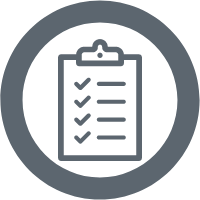Employee Skill and Educational Assessments Organizational
Description
To effectively coach frontline workers to move ahead, you have to understand their current skillset and education level. Assessing their skills, college readiness, and career interests are good places to start, and there are many tools out there that measure a range of skills and attributes. Assessment results are most often used to develop individual education plans with achievable learning milestones that guide an employee towards advancement opportunities, such as training to develop basic skills and work-based learning opportunities.
Process
Assessments are a first step to advance a person’s education or career. Think carefully about who should administer the assessment, who has access to the results, and how the results are reported and used to help a person create a career plan. Career coaches or case managers often administer assessments or partner organizations such as community-based organizations, workforce investment boards, or community colleges. It is important that both employees and managers understand that assessments are for development purposes only, will not be used for performance evaluation, compensation reviews, or as a condition of continued employment.
Here are some common types of skills and educational assessments*:
- Career interests: Interest assessments usually match personal preferences or characteristics to careers. Popular career interest surveys include O*NET Interest Profiler on My Next Move, Strong Interest Inventory®, Holland Code Career Test, StrengthsFinder, and Myers-Briggs Type Indicator
- Literacy levels and college readiness: These types of assessments are usually done in conjunction with other professional development plans. Employees are typically assessed both before and after taking a skills course to determine placement and measure progress. Some of the most common adult learning assessments include Tests of Adult Basic Education (TABE), the Adult Basic Learning Examination (ABLE), Comprehensive Adult Student Assessment System (CASAS) BEST (Basic English Skills Test), ACCUPLACER®, and Compass®.
- Work readiness: These assessments generally measure foundational skills required for workplace success and measure workplace skills that can affect job performance. WorkKeys® is the best known of these types of assessments.
*These examples should not be taken as an endorsement by the National Fund for Workforce Solutions
CareerSTAT Members Implementing This Practice
Resources
A Guide to Upskilling America’s Frontline Worker’s: A Handbook for Employers, Deloitte, in collaboration with the Aspen Institute, 2015.
A handbook offering employers tools for assessing their capacity to upskill their workforce, make the business case, and initiate workforce development programs.
How to conduct a skills gap analysis, Workable.
This blog outlines four steps to conduct a skills gap analysis and links to additional resources.
Assessment Strategies and Reading Profiles: About Assessments, Literacy Information and Communications System.
A website with overviews and evaluations of literacy assessments.
Related Best Practices
Provide Structured Onboarding of New Hires
PROGRAMMATIC | The transition to a new job is often challenging, especially for workers moving from unemployment or a non-clinical environment.
Read MoreCareer Exploration Tools and Opportunities
PROGRAMMATIC | Job seekers and people in entry-level jobs may have had little opportunity to consider how to build a career.
Read MoreWork-Based Learning
PROGRAMMATIC | Work-based learning is an educational strategy combines classroom and real-life work experiences.
Read MoreCareer Pathways
PROGRAMMATIC | Healthcare provides one of the greatest opportunities for jobs in today’s economy. However, many people do not know about the array of healthcare jobs that exist and struggle to see how an entry level job can grow into a career.
Read MoreCareer Coaching
PROGRAMMATIC | One of the advantages to working in healthcare is that offers multiple career paths that lead to jobs paying family-sustaining wages.
Read MoreBasic Skill Development
PROGRAMMATIC | Entry-level employees don’t always have the reading, math, technology, or English language skills to excel in their current position or advance their career.
Read More


